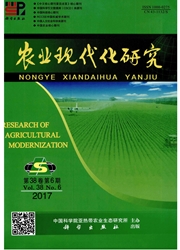

 中文摘要:
中文摘要:
基于对陕西省西安、咸阳、渭南、宝鸡、汉中5市的调查,采用层次分析法,利用包括居住条件、经济状况、职业发展、社会关系、基本权利和心理认同等6个维度的评估指标体系,测算了各市农民工市民化程度,探讨了不同地区农民工市民化程度的差异和影响因素。结果表明,5市在农民工综合市民化程度和各维度的市民化程度上均存在明显的区域差异;其中汉中农民工市民化综合程度最高为48.09%,西安最低为40.59%;各维度市民化程度中,基本权利市民化程度差异最大,5市极差为25.55%,居住条件市民化程度差异最小,但5市极差也达10.49%。年龄、文化程度、个人收入水平、地区收入水平等因素都影响着农民工市民化程度,但各影响因素对市民化程度的不同维度所起的作用不同。因此,推进农民工市民化进程,各地应从实际出发,因地制宜地采取综合性的政策措施协调推进。
 英文摘要:
英文摘要:
B ased on the survey data of rural m igrant w orkers from 5 cities in Shaanxi Province, including X i’an, X ianyang,W einan,B aojiand H anzhong city,and applying the A nalytic H ierarchy Process (A H P),this paper evaluated the differences and influencing factors about the urbanization degree of rural m igrant w orkers in 5 cities by a com prehensive index system of six individual indicators, including living conditions, econom ic status, professional developm ent, social netw ork, basic rights, and psychological aw areness. R esults show that there w ere large regional differences for both the com prehensive index and the individual indicators of the urbanization degrees of rural m igrant workersamong5cities,ShaanxiProvince.Thehighestcomprehensiveurbanizationdegreeofruralmigrantworkerswas 48.09% in H anzhong city and but the low est w as 40.59% in X i’an city. For individual indicators, the m axim um difference w as found in the basic rights and m inim um difference w as found in living conditions. R esults also show that the influence factors include age, cultural level, personal incom e level, and regional incom e level. B ut different factors playeddifferentrolesoneachindividualindicator.Inordertoimprovetheurbanizationdegreeofruralmigrantworkers, com prehensive policy m easures should be created according to localconditions in differentcities.
 同期刊论文项目
同期刊论文项目
 同项目期刊论文
同项目期刊论文
 期刊信息
期刊信息
